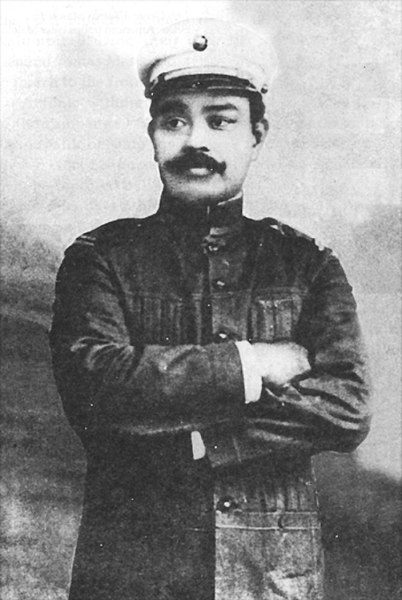June 1899: Filipino power struggle during the Philippine-American War

General Antonio Luna / Image: Wikimedia
On June 5, 1899, the talented and controversial Filipino general, Antonio Luna, was killed in Cabanatuan. He was not killed during a battle with the United States Army. He died during an internal power strife within the Philippine Revolutionary Army. The 32-year-old general had created many enemies within the revolutionary movement, especially among General Emilio Aguinaldo’s guards in the Kawit Company. The guards only took orders from General Aguinaldo.
General Luna had received a telegram signed by General Aguinaldo on June 2, 1899. The telegram had requested Luna’s attendance at a meeting with Aguinaldo in Cabanatuan. When Luna arrived in Cabanatuan, Aguinaldo was not present. However, members of Aguinaldo’s Kawit Company guard were present, including men whom Luna had reprimanded previously.
Ultimately, the Kawit Company guards brutally assassinated Luna by numerous gun shots and stabbings. The controversial question of who ordered the killing of General Luna has been debated extensively. The answer has not been definitive. Since General Aguinaldo was not present in Cabanatuan, he had plausible deniability. Despite the ghastly assassination, General Luna was buried with full military honors.
General Luna had a comfortable childhood. He studied at universities in Manila and Madrid, Spain. Eventually, he earned a medical degree and specialized in contagious and infectious diseases. He was also noted for his newspaper articles against Spanish rule in the Philippines. He was deported and jailed in Spain during the Revolution of 1896. After his release, he studied military strategy, tactics and military science.
With complete confidence in General Luna’s leadership, Emilio Aguinaldo decided to promote Luna in the Fall of 1898 as the Supreme Chief of the Philippine Army. General Luna was known for his quick and explosive temper and unyielding discipline for his troops. Many of his troops resented his discipline. There was boiling dissent among the ranks of the Filipino soldiers.
On the battlefield, General Luna excelled. His most dramatic military action was the counterattack on American forces on Feb. 22 to 24, 1899. The American forces on the outskirts of Manila were still vulnerable during that time. After two days of intense fighting, the Americans were able to thwart the counterattack. Considering the disadvantages that Luna had with untrained soldiers and poor equipment, his performance on the battlefield was exceptional.
An internal power struggle within a revolutionary army was common. During the American Revolutionary War, General George Washington faced serious plots against his leadership in the Continental Army. The Conway Cabal was the most challenging plot against his authority.
By the Fall of 1777, the American forces under General George Washington’s leadership had been defeated during the Philadelphia Campaign. This was a low point in George Washington’s leadership. His subordinate, General Horatio Gage, had won an impressive victory in Saratoga, New York. All General Washington could do was to establish a winter encampment at Valley Forge, Pennsylvania, and prepare for the next offensive.
Members of Congress and several senior officers thought that it was time for Washington to retire and head home to Mount Vernon, Virginia. The plotters thought that General Gage should be the new commander. Fortunately, General Washington survived the bloodless plot, and he went on to bigger and better things.
During the Philippine Revolution of 1896, there was also a power struggle within the revolutionary movement. The initial leader of the revolutionary movement, Andres Bonifacio, was a brilliant organizer and planner, but he was a terrible military leader. Due to his lack of military leadership skills, he needed to be replaced as soon as possible. General Emilio Aguinaldo was the consensus choice for his replacement.
Naturally, Bonifacio and his brother, Procopio Bonifacio, vehemently disagreed with the changes in the power dynamics. They did not accept the changes in senior leadership of the revolutionary movement. They were put on trial and were convicted of treason and sedition. There was very little evidence to support the charges. They were sentenced to death at the trial. Their sentences were commuted to banishment. After additional internal strife, the death penalties were reinstated and carried out.
There can be unintended consequences of a power struggle in a revolutionary war. This was the case during the conventional phase of the Philippine-American War. With the untimely death of General Luna on June 5, 1899, the Filipinos had lost their best military mind and leader. The conventional phase of the Philippine-American War lasted until November 1899. If General Luna had lived, maybe there would have been a better outcome in the conventional phase of the war. Also, General Luna would have seen the utility of commencing earlier the guerrilla phase of the Philippine-American War.
Dennis Edward Flake is the author of three books on Philippine-American history. He is a Public Historian and a former park ranger in interpretation for the National Park Service at the Eisenhower National Historic Site in Gettysburg, PA. He can be contacted at: flakedennis@gmail.com.

